Self-Reflection Essay: Cultural Background, Identity, and Conflict
VerifiedAdded on 2022/09/15
|6
|1530
|11
Essay
AI Summary
This essay presents a self-reflection analysis, comparing the student's cultural background (South Asian/Indian) with that of Australians. It explores how cultural differences influence identity, attitudes, personality, and behavior, particularly in conflict management and communication within an organizational setting. The essay utilizes tools like the Johari Window, Myers-Briggs Type Indicator (MBTI), and DISC assessment to analyze the student's self-identity, revealing strengths, weaknesses, and personality traits. The student reflects on how these tools have improved their understanding of themselves and their interactions with others, especially in navigating conflicts and improving communication skills. The analysis highlights the importance of self-awareness, cultural sensitivity, and adapting to diverse perspectives to enhance effectiveness in a multicultural work environment. The essay concludes with insights on how to leverage cultural understanding and self-reflection for better collaboration and conflict resolution.
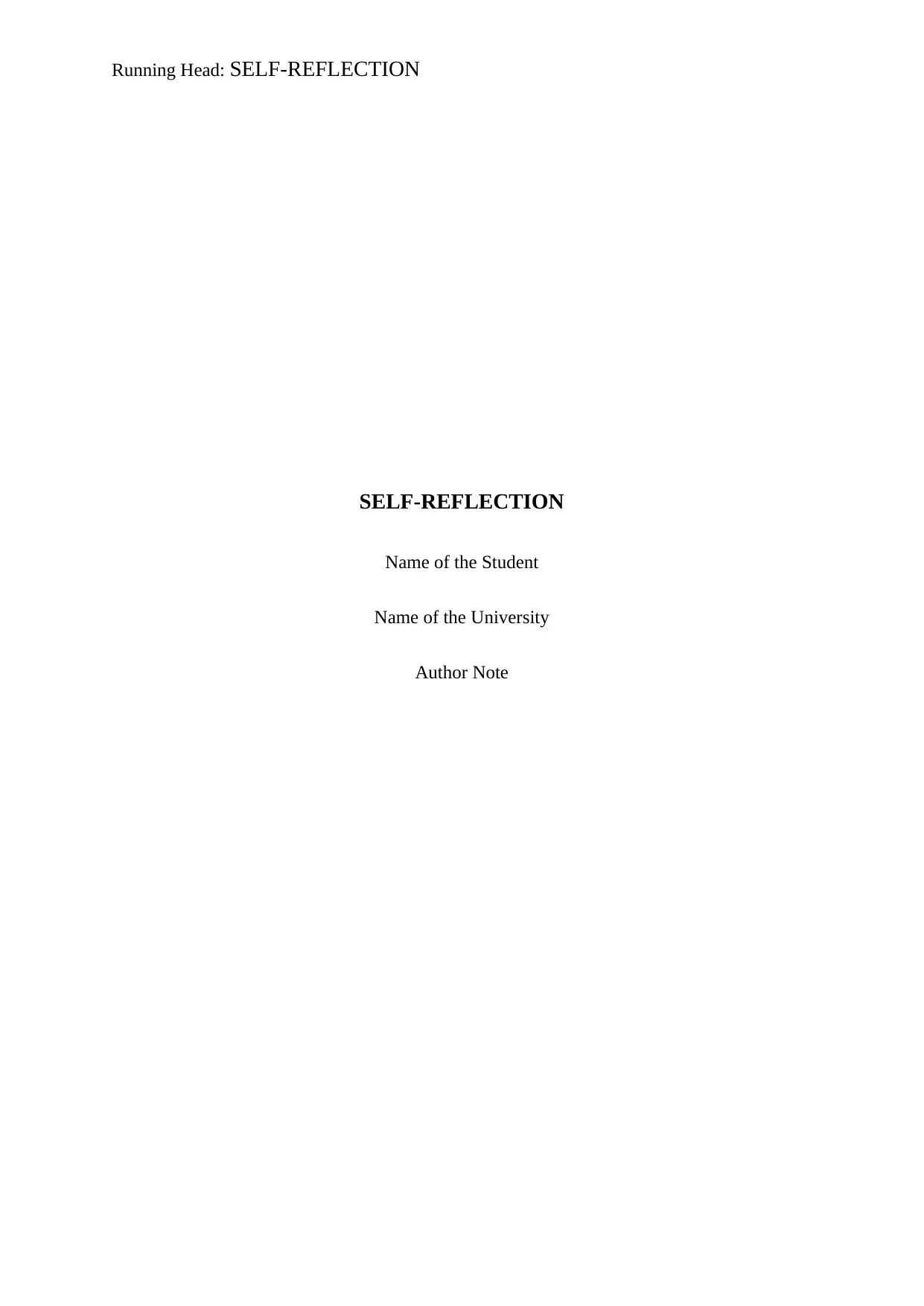
Running Head: SELF-REFLECTION
SELF-REFLECTION
Name of the Student
Name of the University
Author Note
SELF-REFLECTION
Name of the Student
Name of the University
Author Note
Paraphrase This Document
Need a fresh take? Get an instant paraphrase of this document with our AI Paraphraser
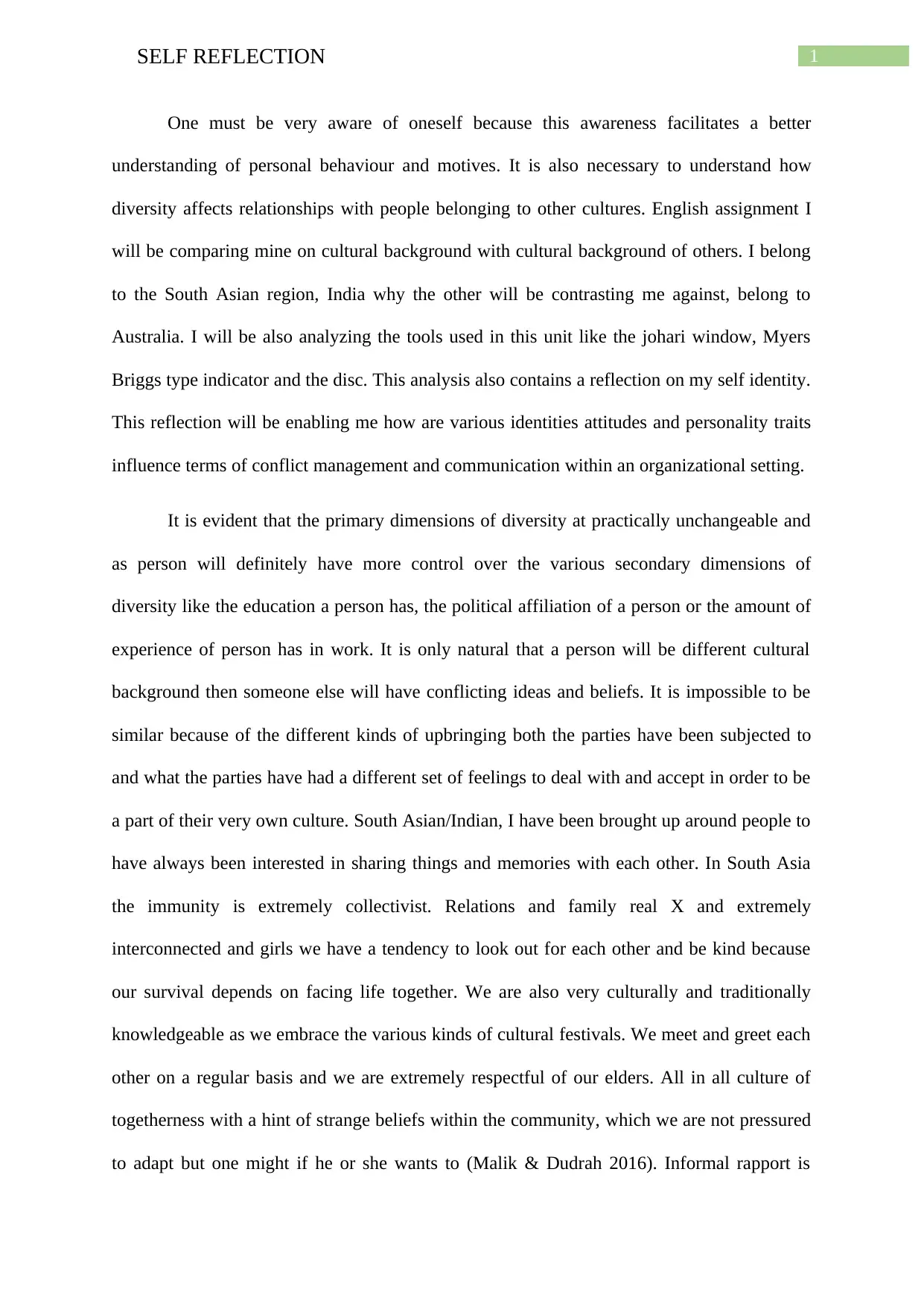
1SELF REFLECTION
One must be very aware of oneself because this awareness facilitates a better
understanding of personal behaviour and motives. It is also necessary to understand how
diversity affects relationships with people belonging to other cultures. English assignment I
will be comparing mine on cultural background with cultural background of others. I belong
to the South Asian region, India why the other will be contrasting me against, belong to
Australia. I will be also analyzing the tools used in this unit like the johari window, Myers
Briggs type indicator and the disc. This analysis also contains a reflection on my self identity.
This reflection will be enabling me how are various identities attitudes and personality traits
influence terms of conflict management and communication within an organizational setting.
It is evident that the primary dimensions of diversity at practically unchangeable and
as person will definitely have more control over the various secondary dimensions of
diversity like the education a person has, the political affiliation of a person or the amount of
experience of person has in work. It is only natural that a person will be different cultural
background then someone else will have conflicting ideas and beliefs. It is impossible to be
similar because of the different kinds of upbringing both the parties have been subjected to
and what the parties have had a different set of feelings to deal with and accept in order to be
a part of their very own culture. South Asian/Indian, I have been brought up around people to
have always been interested in sharing things and memories with each other. In South Asia
the immunity is extremely collectivist. Relations and family real X and extremely
interconnected and girls we have a tendency to look out for each other and be kind because
our survival depends on facing life together. We are also very culturally and traditionally
knowledgeable as we embrace the various kinds of cultural festivals. We meet and greet each
other on a regular basis and we are extremely respectful of our elders. All in all culture of
togetherness with a hint of strange beliefs within the community, which we are not pressured
to adapt but one might if he or she wants to (Malik & Dudrah 2016). Informal rapport is
One must be very aware of oneself because this awareness facilitates a better
understanding of personal behaviour and motives. It is also necessary to understand how
diversity affects relationships with people belonging to other cultures. English assignment I
will be comparing mine on cultural background with cultural background of others. I belong
to the South Asian region, India why the other will be contrasting me against, belong to
Australia. I will be also analyzing the tools used in this unit like the johari window, Myers
Briggs type indicator and the disc. This analysis also contains a reflection on my self identity.
This reflection will be enabling me how are various identities attitudes and personality traits
influence terms of conflict management and communication within an organizational setting.
It is evident that the primary dimensions of diversity at practically unchangeable and
as person will definitely have more control over the various secondary dimensions of
diversity like the education a person has, the political affiliation of a person or the amount of
experience of person has in work. It is only natural that a person will be different cultural
background then someone else will have conflicting ideas and beliefs. It is impossible to be
similar because of the different kinds of upbringing both the parties have been subjected to
and what the parties have had a different set of feelings to deal with and accept in order to be
a part of their very own culture. South Asian/Indian, I have been brought up around people to
have always been interested in sharing things and memories with each other. In South Asia
the immunity is extremely collectivist. Relations and family real X and extremely
interconnected and girls we have a tendency to look out for each other and be kind because
our survival depends on facing life together. We are also very culturally and traditionally
knowledgeable as we embrace the various kinds of cultural festivals. We meet and greet each
other on a regular basis and we are extremely respectful of our elders. All in all culture of
togetherness with a hint of strange beliefs within the community, which we are not pressured
to adapt but one might if he or she wants to (Malik & Dudrah 2016). Informal rapport is
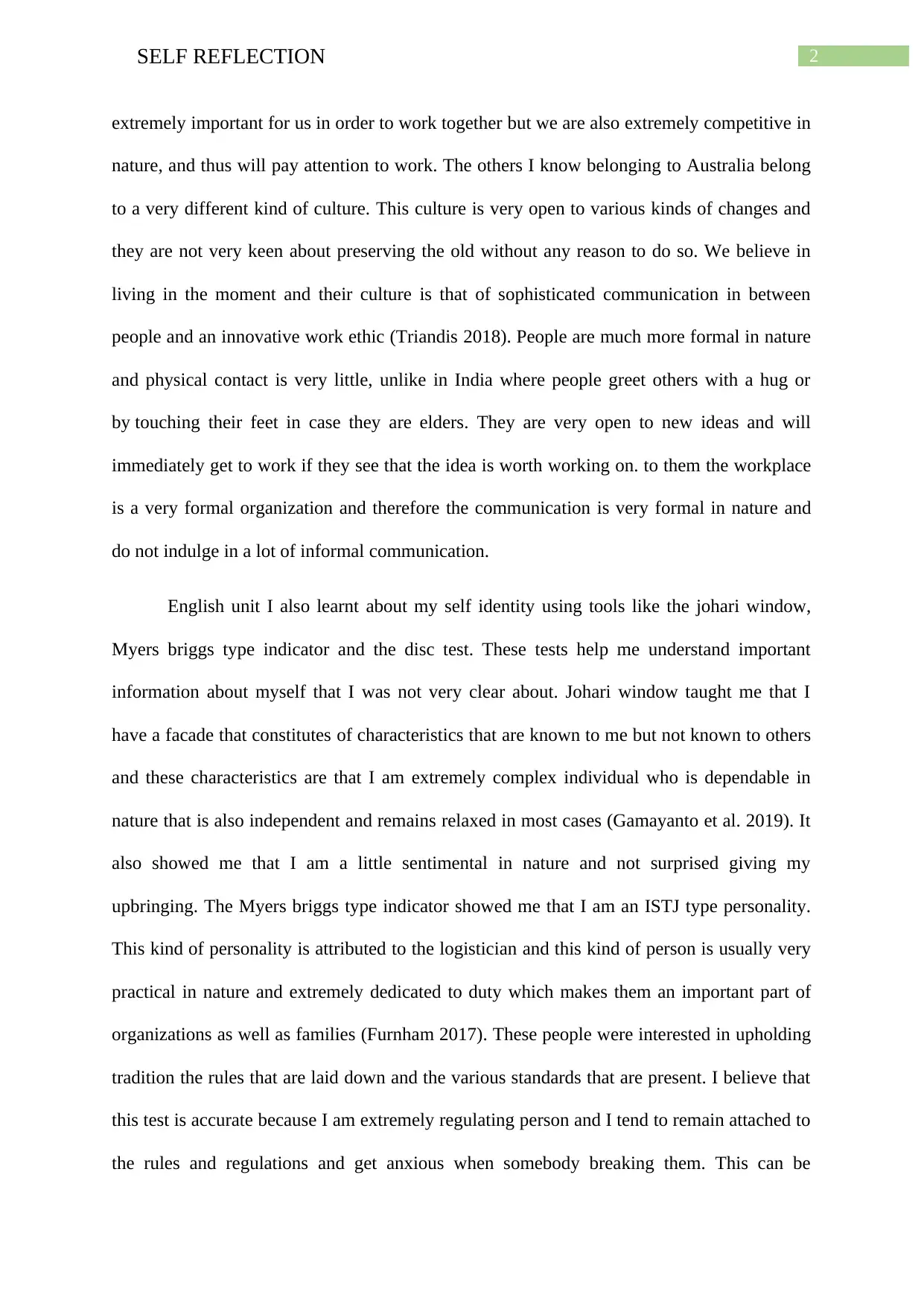
2SELF REFLECTION
extremely important for us in order to work together but we are also extremely competitive in
nature, and thus will pay attention to work. The others I know belonging to Australia belong
to a very different kind of culture. This culture is very open to various kinds of changes and
they are not very keen about preserving the old without any reason to do so. We believe in
living in the moment and their culture is that of sophisticated communication in between
people and an innovative work ethic (Triandis 2018). People are much more formal in nature
and physical contact is very little, unlike in India where people greet others with a hug or
by touching their feet in case they are elders. They are very open to new ideas and will
immediately get to work if they see that the idea is worth working on. to them the workplace
is a very formal organization and therefore the communication is very formal in nature and
do not indulge in a lot of informal communication.
English unit I also learnt about my self identity using tools like the johari window,
Myers briggs type indicator and the disc test. These tests help me understand important
information about myself that I was not very clear about. Johari window taught me that I
have a facade that constitutes of characteristics that are known to me but not known to others
and these characteristics are that I am extremely complex individual who is dependable in
nature that is also independent and remains relaxed in most cases (Gamayanto et al. 2019). It
also showed me that I am a little sentimental in nature and not surprised giving my
upbringing. The Myers briggs type indicator showed me that I am an ISTJ type personality.
This kind of personality is attributed to the logistician and this kind of person is usually very
practical in nature and extremely dedicated to duty which makes them an important part of
organizations as well as families (Furnham 2017). These people were interested in upholding
tradition the rules that are laid down and the various standards that are present. I believe that
this test is accurate because I am extremely regulating person and I tend to remain attached to
the rules and regulations and get anxious when somebody breaking them. This can be
extremely important for us in order to work together but we are also extremely competitive in
nature, and thus will pay attention to work. The others I know belonging to Australia belong
to a very different kind of culture. This culture is very open to various kinds of changes and
they are not very keen about preserving the old without any reason to do so. We believe in
living in the moment and their culture is that of sophisticated communication in between
people and an innovative work ethic (Triandis 2018). People are much more formal in nature
and physical contact is very little, unlike in India where people greet others with a hug or
by touching their feet in case they are elders. They are very open to new ideas and will
immediately get to work if they see that the idea is worth working on. to them the workplace
is a very formal organization and therefore the communication is very formal in nature and
do not indulge in a lot of informal communication.
English unit I also learnt about my self identity using tools like the johari window,
Myers briggs type indicator and the disc test. These tests help me understand important
information about myself that I was not very clear about. Johari window taught me that I
have a facade that constitutes of characteristics that are known to me but not known to others
and these characteristics are that I am extremely complex individual who is dependable in
nature that is also independent and remains relaxed in most cases (Gamayanto et al. 2019). It
also showed me that I am a little sentimental in nature and not surprised giving my
upbringing. The Myers briggs type indicator showed me that I am an ISTJ type personality.
This kind of personality is attributed to the logistician and this kind of person is usually very
practical in nature and extremely dedicated to duty which makes them an important part of
organizations as well as families (Furnham 2017). These people were interested in upholding
tradition the rules that are laid down and the various standards that are present. I believe that
this test is accurate because I am extremely regulating person and I tend to remain attached to
the rules and regulations and get anxious when somebody breaking them. This can be
⊘ This is a preview!⊘
Do you want full access?
Subscribe today to unlock all pages.

Trusted by 1+ million students worldwide
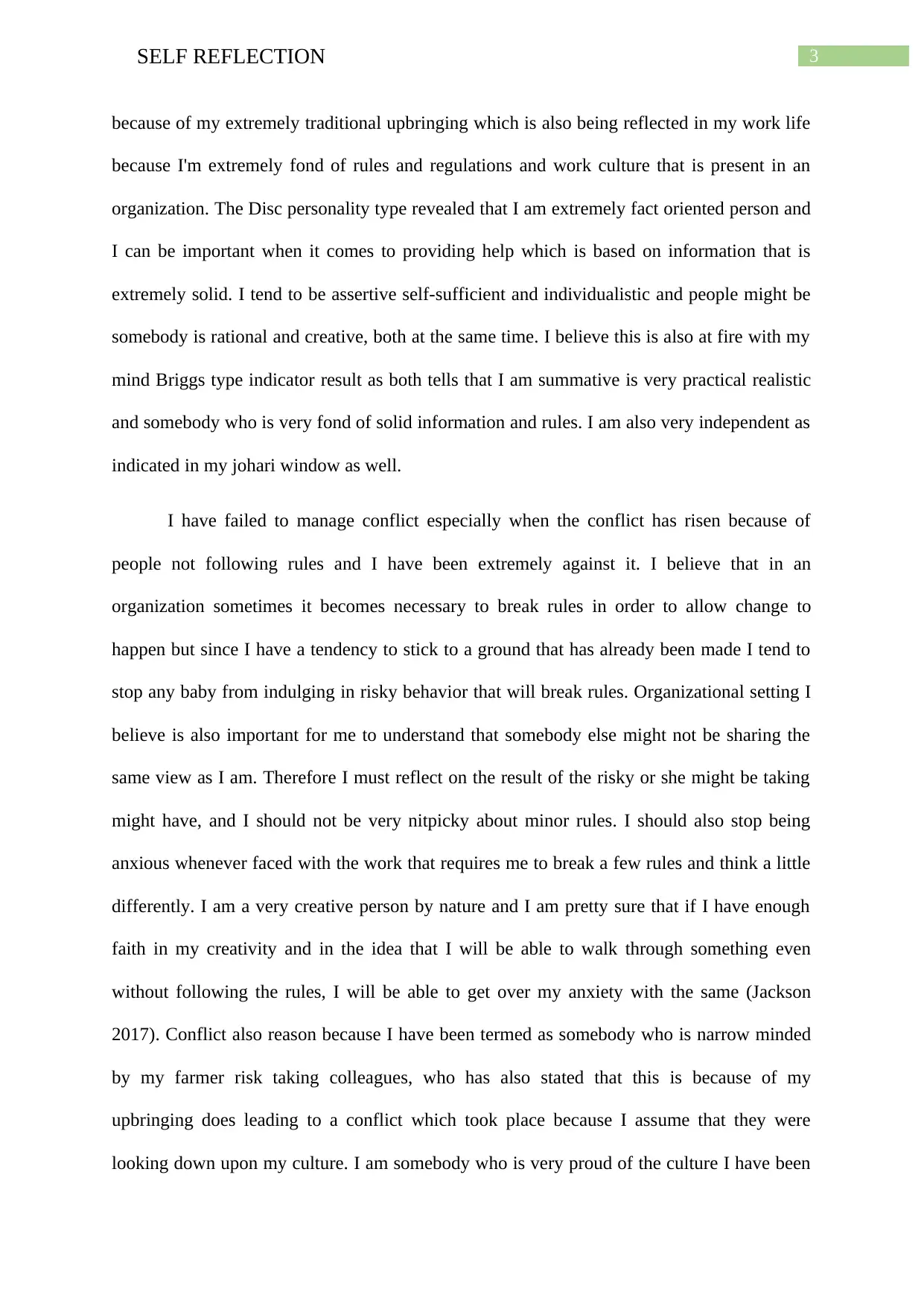
3SELF REFLECTION
because of my extremely traditional upbringing which is also being reflected in my work life
because I'm extremely fond of rules and regulations and work culture that is present in an
organization. The Disc personality type revealed that I am extremely fact oriented person and
I can be important when it comes to providing help which is based on information that is
extremely solid. I tend to be assertive self-sufficient and individualistic and people might be
somebody is rational and creative, both at the same time. I believe this is also at fire with my
mind Briggs type indicator result as both tells that I am summative is very practical realistic
and somebody who is very fond of solid information and rules. I am also very independent as
indicated in my johari window as well.
I have failed to manage conflict especially when the conflict has risen because of
people not following rules and I have been extremely against it. I believe that in an
organization sometimes it becomes necessary to break rules in order to allow change to
happen but since I have a tendency to stick to a ground that has already been made I tend to
stop any baby from indulging in risky behavior that will break rules. Organizational setting I
believe is also important for me to understand that somebody else might not be sharing the
same view as I am. Therefore I must reflect on the result of the risky or she might be taking
might have, and I should not be very nitpicky about minor rules. I should also stop being
anxious whenever faced with the work that requires me to break a few rules and think a little
differently. I am a very creative person by nature and I am pretty sure that if I have enough
faith in my creativity and in the idea that I will be able to walk through something even
without following the rules, I will be able to get over my anxiety with the same (Jackson
2017). Conflict also reason because I have been termed as somebody who is narrow minded
by my farmer risk taking colleagues, who has also stated that this is because of my
upbringing does leading to a conflict which took place because I assume that they were
looking down upon my culture. I am somebody who is very proud of the culture I have been
because of my extremely traditional upbringing which is also being reflected in my work life
because I'm extremely fond of rules and regulations and work culture that is present in an
organization. The Disc personality type revealed that I am extremely fact oriented person and
I can be important when it comes to providing help which is based on information that is
extremely solid. I tend to be assertive self-sufficient and individualistic and people might be
somebody is rational and creative, both at the same time. I believe this is also at fire with my
mind Briggs type indicator result as both tells that I am summative is very practical realistic
and somebody who is very fond of solid information and rules. I am also very independent as
indicated in my johari window as well.
I have failed to manage conflict especially when the conflict has risen because of
people not following rules and I have been extremely against it. I believe that in an
organization sometimes it becomes necessary to break rules in order to allow change to
happen but since I have a tendency to stick to a ground that has already been made I tend to
stop any baby from indulging in risky behavior that will break rules. Organizational setting I
believe is also important for me to understand that somebody else might not be sharing the
same view as I am. Therefore I must reflect on the result of the risky or she might be taking
might have, and I should not be very nitpicky about minor rules. I should also stop being
anxious whenever faced with the work that requires me to break a few rules and think a little
differently. I am a very creative person by nature and I am pretty sure that if I have enough
faith in my creativity and in the idea that I will be able to walk through something even
without following the rules, I will be able to get over my anxiety with the same (Jackson
2017). Conflict also reason because I have been termed as somebody who is narrow minded
by my farmer risk taking colleagues, who has also stated that this is because of my
upbringing does leading to a conflict which took place because I assume that they were
looking down upon my culture. I am somebody who is very proud of the culture I have been
Paraphrase This Document
Need a fresh take? Get an instant paraphrase of this document with our AI Paraphraser
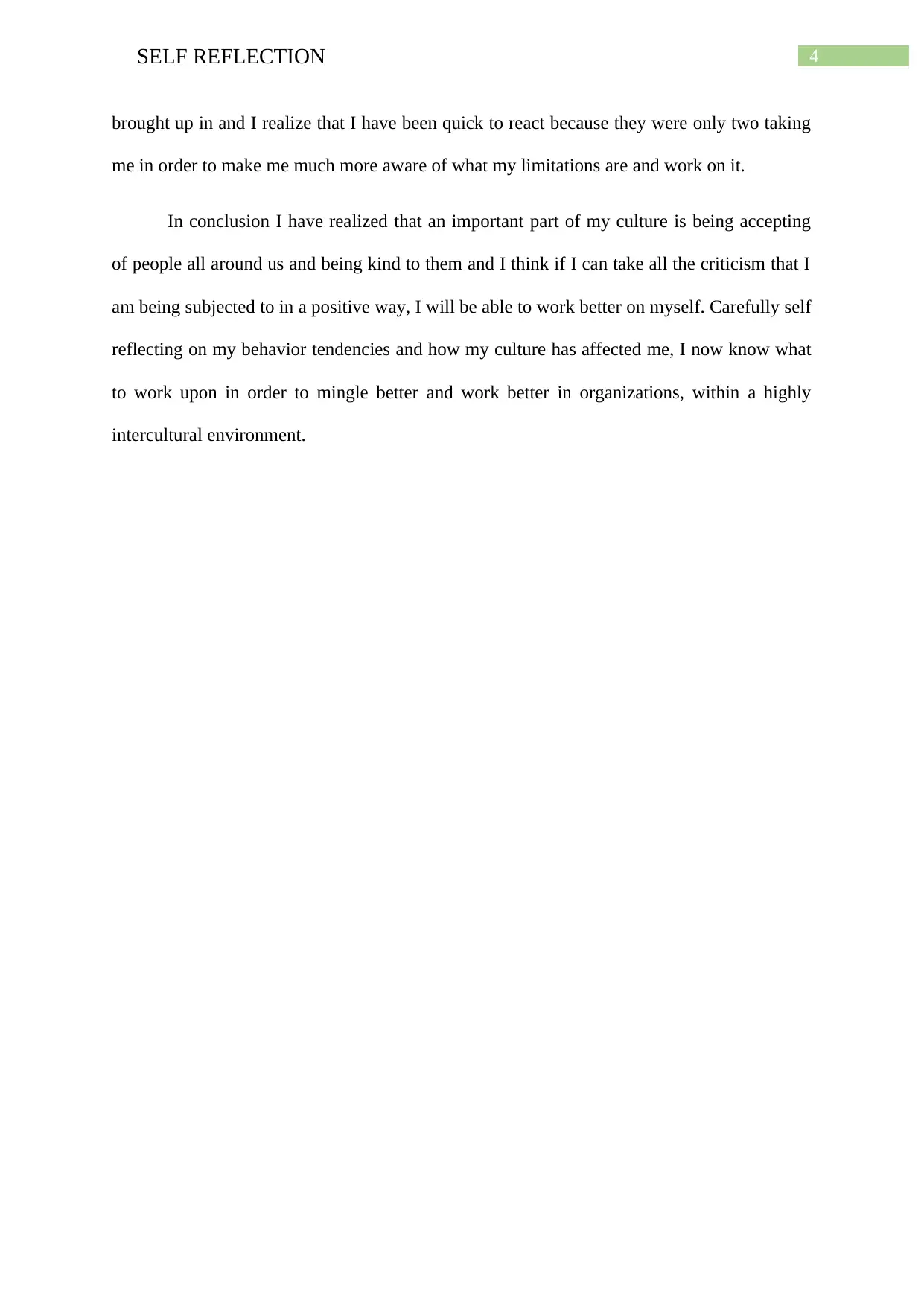
4SELF REFLECTION
brought up in and I realize that I have been quick to react because they were only two taking
me in order to make me much more aware of what my limitations are and work on it.
In conclusion I have realized that an important part of my culture is being accepting
of people all around us and being kind to them and I think if I can take all the criticism that I
am being subjected to in a positive way, I will be able to work better on myself. Carefully self
reflecting on my behavior tendencies and how my culture has affected me, I now know what
to work upon in order to mingle better and work better in organizations, within a highly
intercultural environment.
brought up in and I realize that I have been quick to react because they were only two taking
me in order to make me much more aware of what my limitations are and work on it.
In conclusion I have realized that an important part of my culture is being accepting
of people all around us and being kind to them and I think if I can take all the criticism that I
am being subjected to in a positive way, I will be able to work better on myself. Carefully self
reflecting on my behavior tendencies and how my culture has affected me, I now know what
to work upon in order to mingle better and work better in organizations, within a highly
intercultural environment.
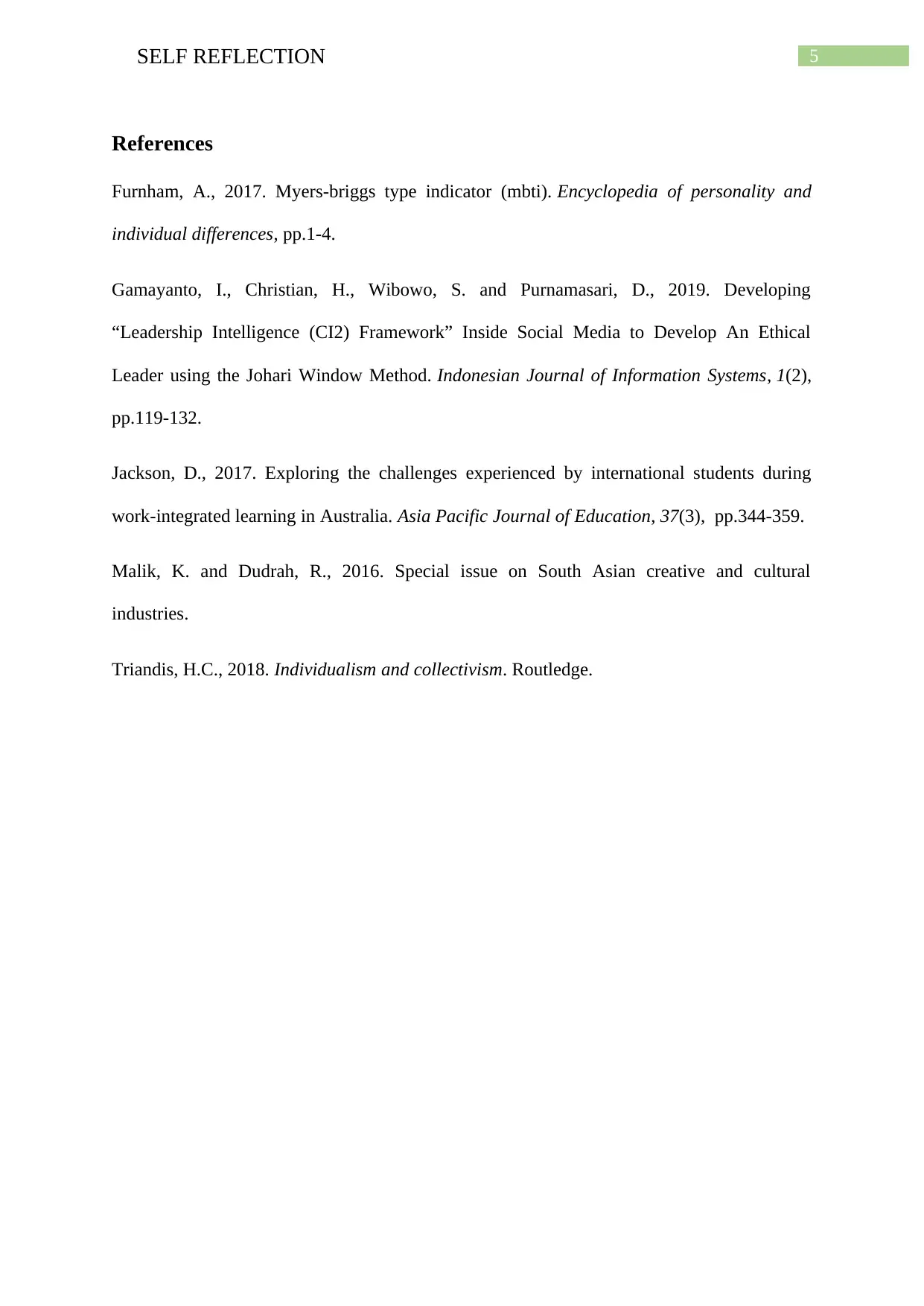
5SELF REFLECTION
References
Furnham, A., 2017. Myers-briggs type indicator (mbti). Encyclopedia of personality and
individual differences, pp.1-4.
Gamayanto, I., Christian, H., Wibowo, S. and Purnamasari, D., 2019. Developing
“Leadership Intelligence (CI2) Framework” Inside Social Media to Develop An Ethical
Leader using the Johari Window Method. Indonesian Journal of Information Systems, 1(2),
pp.119-132.
Jackson, D., 2017. Exploring the challenges experienced by international students during
work-integrated learning in Australia. Asia Pacific Journal of Education, 37(3), pp.344-359.
Malik, K. and Dudrah, R., 2016. Special issue on South Asian creative and cultural
industries.
Triandis, H.C., 2018. Individualism and collectivism. Routledge.
References
Furnham, A., 2017. Myers-briggs type indicator (mbti). Encyclopedia of personality and
individual differences, pp.1-4.
Gamayanto, I., Christian, H., Wibowo, S. and Purnamasari, D., 2019. Developing
“Leadership Intelligence (CI2) Framework” Inside Social Media to Develop An Ethical
Leader using the Johari Window Method. Indonesian Journal of Information Systems, 1(2),
pp.119-132.
Jackson, D., 2017. Exploring the challenges experienced by international students during
work-integrated learning in Australia. Asia Pacific Journal of Education, 37(3), pp.344-359.
Malik, K. and Dudrah, R., 2016. Special issue on South Asian creative and cultural
industries.
Triandis, H.C., 2018. Individualism and collectivism. Routledge.
⊘ This is a preview!⊘
Do you want full access?
Subscribe today to unlock all pages.

Trusted by 1+ million students worldwide
1 out of 6
Related Documents
Your All-in-One AI-Powered Toolkit for Academic Success.
+13062052269
info@desklib.com
Available 24*7 on WhatsApp / Email
![[object Object]](/_next/static/media/star-bottom.7253800d.svg)
Unlock your academic potential
Copyright © 2020–2026 A2Z Services. All Rights Reserved. Developed and managed by ZUCOL.





